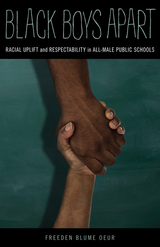
How neoliberalism and the politics of respectability are transforming African American manhood
While single-sex public schools face much criticism, many Black communities see in them a great promise: that they can remedy a crisis for their young men. Black Boys Apart reveals triumphs, hope, and heartbreak at two all-male schools, a public high school and a charter high school, drawing on Freeden Blume Oeur’s ethnographic work. We meet young men who felt their schools empowered and emasculated them, parents who were frustrated with co-ed schools, teachers who helped pave the road to college, and administrators who saw in Black male academies the advantages of privatizing education.
While the two schools have distinctive histories and ultimately charted different paths, they were both shaped by the convergence of neoliberal ideologies and a politics of Black respectability. As Blume Oeur reveals, all-boys education is less a school reform initiative and instead joins a legacy of efforts to reform Black manhood during periods of stark racial inequality. Black male academies join long-standing attempts to achieve racial uplift in Black communities, but in ways that elevate exceptional young men and aggravate divisions within those communities.
Black Boys Apart shows all-boys schools to be an odd mix of democratic empowerment and market imperatives, racial segregation and intentional sex separation, strict discipline and loving care. Challenging narratives that endorse these schools for nurturing individual resilience in young Black men, this perceptive and penetrating ethnography argues for a holistic approach in which Black communities and their allies promote a collective resilience.
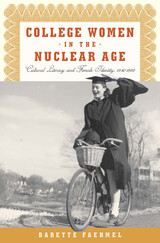
In the popular imagination, American women during the time between the end of World War II and the 1960s—the era of the so-called “feminine mystique”—were ultraconservative and passive. College Women in the Nuclear Age takes a fresh look at these women, showing them actively searching for their place in the world while engaging with the larger intellectual and political movements of the times.
Drawing from the letters and diaries of young women in the Cold War era, Babette Faehmel seeks to restore their unique voices and to chronicle their collective ambitions. She also explores the shifting roles that higher education played in establishing these hopes and dreams, making the case that the GI Bill served to diminish the ambitions of many American women even as it opened opportunities for many American men. A treasure-trove of original research, the book should stimulate scholarly discussion and captivate any reader interested in the thoughts and lives of American women.

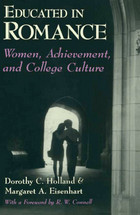
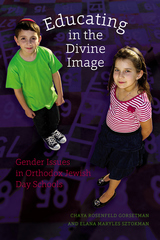
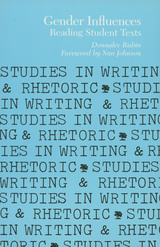
Donnalee Rubin examines the responses of thirty-one freshman composition teachers to student writing and shows the negative effects of gender bias on assessment to prove that gender perceptions and expectations can influence assessment decisions that seem neutral on the surface. Arguing that certain pedagogies are more likely to minimize gender bias than others, Rubin believes that teachers are more likely to overcome the influence of gender bias on their teaching if they adopt a process-based method and work intimately with their students through nondirective, supportive conferences.
Rubin characterizes the conference/process-centered class as the type of environment in which maternal teaching can be cultivated. She stresses that maternal can describe any teacher, male or female, who exhibits the nurturing and supportive qualities that the conference/process approach embodies. With a primary focus on the student’s well-being and development as a person and a writer, the maternal teacher is in a better position to overcome gender bias that could distort the interpretation of student texts. In order for writing instructors to increase their sensitivity to gender issues in assessment, Rubin recommends that they self-consciously engage in what she calls "responsive reading." Responsive reading occurs when the teacher reads with an eye toward providing the sorts of supportive feedback and dialectic exchange that will encourage student writers to think for themselves and to revise effectively. Rubin argues that when teachers commit to a responsive-reading pedagogy, they are more likely to question their reactions to student writing along the lines of gender influence and to strive for self-conscious awareness of how their own inner male-female voices may distort their reading of student texts. She challenges all writing teachers to become more aware of the inevitable challenge gender influence presents.
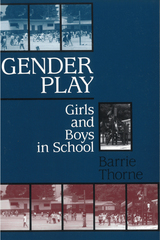
Thorne observes children in schools in working-class communities, emphasizing the experiences of fourth and fifth graders. Most of the children she observed were white, but a sizable minority were Latino, Chicano, or African American. Thorne argues that the organization and meaning of gender are influenced by age, ethnicity, race, sexuality, and social class, and that they shift with social context. She sees gender identity not through the lens of individual socialization or difference, but rather as a social process involving groups of children. Thorne takes us on a fascinating journey of discovery, provides new insights about children, and offers teachers practical suggestions for increasing cooperative mixed-gender interaction.
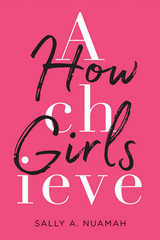
Winner of the Jackie Kirk Award
Winner of the AESA Critics’ Choice Award
“Blazes new trails in the study of the lives of girls, challenging all of us who care about justice and gender equity not only to create just and inclusive educational institutions but to be unapologetically feminist in doing so. Seamlessly merging research with the stories and voices of girls and those who educate them, this book reminds us that we should do better and inspires the belief that we can. It is the blueprint we’ve been waiting for.”
—Brittney C. Cooper, author of Eloquent Rage
“Nuamah makes a compelling and convincing case for the development of the type of school that can not only teach girls but also transform them…An essential read for all educators, policymakers, and parents invested in a better future.”
—Joyce Banda, former President of the Republic of Malawi
This bold and necessary book points out a simple and overlooked truth: most schools never had girls in mind to begin with. That is why the world needs what Sally Nuamah calls “feminist schools,” deliberately designed to provide girls with achievement-oriented identities. And she shows how these schools would help all students, regardless of their gender.
Educated women raise healthier families, build stronger communities, and generate economic opportunities for themselves and their children. Yet millions of disadvantaged girls never make it to school—and too many others drop out or fail. Upending decades of advice and billions of dollars in aid, Nuamah argues that this happens because so many challenges girls confront—from sexual abuse to unequal access to materials and opportunities—go unaddressed. But it isn’t enough just to go to school. What you learn there has to prepare you for the world where you’ll put that knowledge to work.
A compelling and inspiring scholar who has founded a nonprofit to test her ideas, Nuamah reveals that developing resilience is not a gender-neutral undertaking. Preaching grit doesn’t help girls; it actively harms them. Drawing on her deep immersion in classrooms in the United States, Ghana, and South Africa, Nuamah calls for a new approach: creating feminist schools that will actively teach girls how and when to challenge society’s norms, and allow them to carve out their own paths to success.
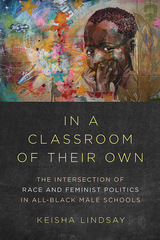
Keisha Lindsay explains the complex politics of ABMSs by situating these schools within broader efforts at neoliberal education reform and within specific conversations about both "endangered” black males and a “boy crisis” in education. Lindsay also demonstrates that intersectionality, long considered feminist, is in fact a politically fluid framework. As such, it represents a potent tool for advancing many political agendas, including those of ABMSs supporters who champion antiracist education for black boys while obscuring black girls’ own race and gender-based oppression in school. Finally, Lindsay theorizes a particular means by which black men and other groups can form antiracist and feminist coalitions even when they make claims about their experiences that threaten bridge building. The way forward, Lindsay shows, allows disadvantaged groups to navigate the racial and gendered politics that divide them in pursuit of productive—and progressive—solutions.
Far-thinking and boldly argued, In a Classroom of Their Own explores the dilemmas faced by professionals and parents in search of equitable schooling for all students—black boys and otherwise.
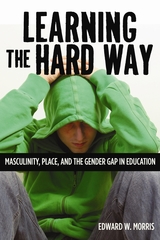
An avalanche of recent newspapers, weekly newsmagazines, scholarly journals, and academic books has helped to spark a heated debate by publishing warnings of a “boy crisis” in which male students at all academic levels have begun falling behind their female peers. In Learning the Hard Way, Edward W. Morris explores and analyzes detailed ethnographic data on this purported gender gap between boys and girls in educational achievement at two low-income high schools—one rural and predominantly white, the other urban and mostly African American. Crucial questions arose from his study of gender at these two schools. Why did boys tend to show less interest in and more defiance toward school? Why did girls significantly outperform boys at both schools? Why did people at the schools still describe boys as especially “smart”?
Morris examines these questions and, in the process, illuminates connections of gender to race, class, and place. This book is not simply about the educational troubles of boys, but the troubled and complex experience of gender in school. It reveals how particular race, class, and geographical experiences shape masculinity and femininity in ways that affect academic performance. His findings add a new perspective to the “gender gap” in achievement.
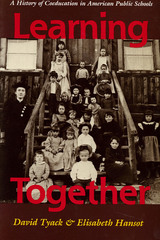
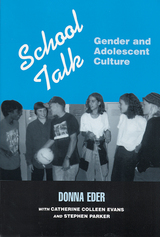
KACTIS revealed many social and ethical issues, launching Eder into more research, this time learning from Navajo and Kenyan storytellers how children can understand ethics and diversity through practices used in oral cultures. She borrowed non-Western concepts of learning as she crafted a service-learning project, Storytelling as Reflecting Time (START), which became the basis of a service-learning course, Knowledge and Community, taught to sociology majors and honor students.
The approach is so effective that Eder cannot accommodate all of the requests she receives for START, which is conducted both in the classroom and through extracurricular activities throughout Bloomington. She works with the Hutton Philanthropic Initiative, where students use storytelling to interact with community children in a meaningful way. Students in her Community Building Across Generations course take their storytelling to a nursing home and a program for children whose families are escaping domestic violence.
Eder also mentors other instructors on campus who are interested in service-learning.
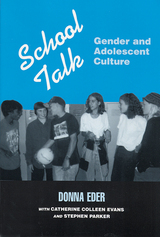
KACTIS revealed many social and ethical issues, launching Eder into more research, this time learning from Navajo and Kenyan storytellers how children can understand ethics and diversity through practices used in oral cultures. She borrowed non-Western concepts of learning as she crafted a service-learning project, Storytelling as Reflecting Time (START), which became the basis of a service-learning course, Knowledge and Community, taught to sociology majors and honor students.
The approach is so effective that Eder cannot accommodate all of the requests she receives for START, which is conducted both in the classroom and through extracurricular activities throughout Bloomington. She works with the Hutton Philanthropic Initiative, where students use storytelling to interact with community children in a meaningful way. Students in her Community Building Across Generations course take their storytelling to a nursing home and a program for children whose families are escaping domestic violence.
Eder also mentors other instructors on campus who are interested in service-learning.
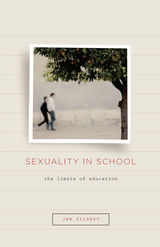
From concerns over the bullying of LGBTQ youth and battles over sex education to the regulation of sexual activity and the affirmation of queer youth identity, sexuality saturates the school day. Rather than understand these conflicts as an interruption to the work of education, Jen Gilbert explores how sexuality comes to bear on and to enliven teaching and learning.
Gilbert investigates the breakdowns, clashes, and controversies that flare up when sexuality enters spaces of schooling. Education must contain the volatility of sexuality, Gilbert argues, and yet, when education seeks to limit the reach of sexuality, it risks shutting learning down. Gilbert penetrates this paradox by turning to fiction, film, legal case studies, and personal experiences. What, she asks, can we learn about school from a study of sexuality?
By examining the strange workings of sexuality in schools, Gilbert draws attention to the explosive but also compelling force of erotic life in teaching and learning. Ultimately, this book illustrates how the most intimate of our experiences can come to shape how we see and act in the world.
READERS
Browse our collection.
PUBLISHERS
See BiblioVault's publisher services.
STUDENT SERVICES
Files for college accessibility offices.
UChicago Accessibility Resources
home | accessibility | search | about | contact us
BiblioVault ® 2001 - 2024
The University of Chicago Press









